|
Inside
Issue N°11 - May 2003
Iraq:
Energy for peace
Pentecost message 2003
Christians in Asia are not alone
IMF-WB-WCC dialogue continues
Summer seminars at Bossey
WCC and AACC address Ivory Coast crisis
People
Latin American churches propose globalizing the fullness
of life
Mission and evangelism conference
Fellowship and finances guide decision to relocate some
WCC offices
New African fellowship
China Christian Council
Sign up for WCC News by E-mail
Recent resources
News briefs
General information on WCC News
Iraq:
Energy for peace
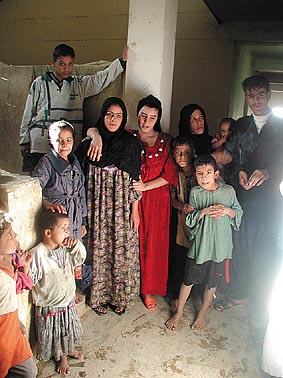
Decades
of war and international sanctions have crippled Iraq's infrastructure,
leaving people like this family in a low-income housing project
in Amara very vulnerable.
© David P. Young, PCUSA/ACT International |
On
20 March 2003 as the US-led war on Iraq began, Rev. Dr Konrad
Raiser condemned the military action that ignored international
law, world-wide public opinion, and non-violent efforts to resolve
the conflict.
Yet
the World Council of Churches (WCC) general secretary also noted
that "The response from the churches against the war in Iraq
has been an unprecedented manifestation of unanimity. The energy
released bears witness to a spirituality that calls for peaceful
coexistence of all nations and peoples… That energy must
not be lost."
Such
unanimity was demonstrated at a 5 February WCC meeting where European
church leaders, along with representatives of the National Council
of Churches of Christ in the USA and the Middle East Council of
Churches, issued a strong statement against the war. "For us it
is a spiritual obligation, grounded in Godís love for all humanity,
to speak out against war in Iraq," they said. |
|
The WCC invited regional ecumenical organizations and heads of
member churches to sign this statement. Within a few days, over
180 church leaders and almost 10,000 individuals had done so,
the latter through an on-line signature campaign. The signed statement
was delivered to the UN secretary-general and members of the UN
Security Council in mid-March.
While condemning the
Iraqi regime’s brutal human rights violations, the WCC Executive
Committee meeting in February expressed deep concern that "the
most powerful nations of this world again regard war as an acceptable
instrument of foreign policy". It warned that "war against
Iraq would be immoral, unwise and in breach of the principles
of the UN Charter", and urged efforts to find peaceful, long-term
means to ensure Middle East stability. It also commended the courage
of the US churches in confronting their own government and taking
a leading role in the anti-war movement.
The military outcome
of the war was never in any doubt. Nor was the humanitarian situation
of a country after multiple wars and 12 years of economic sanctions.
Church aid agencies, through Action by Churches Together (ACT),
are facing severe challenges in their efforts to respond to the
needs of Iraq’s civilian population.
Even as the bombs were
falling, there were clear signs that the churches’ protests
against war in Iraq were not in vain. Due in part to the religious
language employed by the Bush administration, it was feared that
the war would heighten tensions between Muslims and Christians.
The strong voice of the WCC, the Roman Catholic Church, churches
in the US and around the world was thus met with relief and gratitude
by Christians and Muslims in the Middle East and elsewhere.
The
WCC continues to analyze the long-term consequences of the continuing
"war on terror". It continues to suggest actions for
the churches. The energy for peace will not be lost. |

Pentecost
message 2003
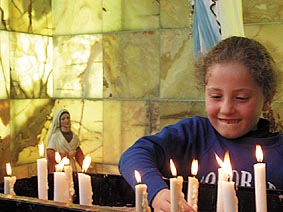
Lighting
candles at the Chaldean Catholic Church in Baghdad
© Hege Opseth (NCA)/ACT International |
Renewal
and reconciliation are signs of the Holy Spirit’s coming,
according to the 2003 Pentecost message from the eight presidents
of the World Council of Churches. Based on the Pentecost account
in Acts 2 and Christ’s promise of the Holy Spirit (John 16:
7-11), the message finds in the Spirit "the power to love those
different from ourselves". |
Although
the earliest church was a multi-cultural and multi-lingual community,
the presidents write that on Pentecost, Christians came to understand
that "we are called to speak with one voice, to care with one heart
and to act in unity".
This
year’s message to the churches notes that the Spirit’s guidance
is more necessary today than ever: "At all times, and increasingly
with the centuries, our species has attempted to manipulate the forces
of the universe. Through such grasping at power, we threaten
to produce chaos and catastrophe. Indeed, this state of affairs is reflected
in a world in which one country and a handful of allies have deliberately
dealt a grievous blow to the recognized instruments of international
order, peace and justice by initiating their illegitimate invasion of
Iraq." The Spirit comes to re-energize all creation, "sustaining
the created cosmos as well as its inhabitants".

Christians
in Asia are not alone
| Assurance
that they have the support of the world-wide ecumenical family
was the message brought to Christian minorities in Asia by World
Council of Churches (WCC) general secretary Rev. Dr Konrad Raiser
on a 26 February - 9 March 2003 visit to Laos, Thailand, Myanmar
(formerly Burma) and Pakistan. During his twelve-day tour —
the first official visit to the four countries by a WCC general
secretary — Raiser contacted not only churches and Christian
institutions, but also leaders of the majority Buddhist and Muslim
religions, representatives of civil society, and government officials
in an effort to strengthen inter-faith links and enhance relations
between local churches and their respective governments.
"I told Islamic
leaders they should thank the churches and Christians in Europe
and the US for their stand on military violence against a Muslim
country," Pakistan’s foreign minister Mr Mehmood Kasuri
told Raiser in reference to the conflict around Iraq. The topic
of the impending war came up in Raiser’s encounters with
Islamic leaders; in these discussions, Raiser noted that the conflict
could not be considered a clash of civilizations, and was unconnected
with religious convictions. He called for dialogue and cooperation
between Christian, Muslim and Buddhist religious communities,
based on the assumption that the "core belief" of all
religions is "the well-being of all human beings". He
also advised the Christians to take a pro-active approach to dialogue,
and not to get caught in a minority complex.
Restrictions to freedom
of religion were evoked by the WCC general secretary during meetings
with government officials. Raiser expressed "concerns about
intentional or involuntary discrimination in certain parts of
the country against Christian minorities and ethnic groups"
to General Khin Nyunt, chief executive of the military-led government
of Myanmar. Meeting with Pakistan’s president General Pervaiz
Musharraf, he questioned that country’s blasphemy laws,
and expressed concern that those responsible for killing Christians
and attacking Christian facilities have not yet been brought to
trial. And with officials of the communist ruling party of Laos,
he referred to a newly-promulgated presidential decree on religious
activities, saying that Christians "cannot practise faith
without linking our love and concern to our neighbours, and we
cannot forget our social involvement".
|
|
|
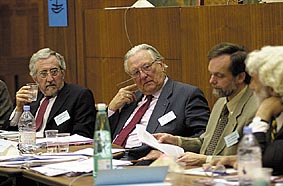
Participants
at the first IMF-WB-WCC encounter in Geneva in February 2003:
(from right) Rob van Drimmelen of APRODEV, an association of the
17 major European development and humanitarian aid organizations
working closely with the WCC, Bob Goudzwaard, moderator of the
encounter, and Graham Hacche, deputy director of the IMF.
©
Peter Williams/WCC
|
IMF-WB-WCC dialogue continues
During
the last week of October, the second in a series of encounters
that would have seemed impossible a decade ago will take place.
Some thirty representatives
of the World Council of Churches (WCC), the International Monetary
Fund (IMF) and the World Bank (WB), will meet in Washington DC,
USA, to continue discussions begun in Geneva (Switzerland) last
February.
|
|
On
the agenda for the Washington encounter are: the participation
of civil society in development, the respective roles of the state
and public and private sectors in development and poverty reduction
efforts, the challenges of globalization, and how international
institutions like the IMF, WB and the WCC are governed and accountable
to their constituencies.
WCC general secretary
Konrad Raiser points out that these encounters bring together
partners "who have so far had very little opportunity to
talk face to face". In that context, the WCC seeks primarily
"to articulate the voices of those who have little opportunity
of influencing the decisions but must bear their consequences".
To prepare for the
Washington encounter, the WCC will bring churches and related
agencies together 10-11 August to discuss a common framework for
understanding IMF and WB policies. The encounters may lead to
a summit meeting between leaders of the three organizations.
|
 |
Summer
seminars at Bossey
Summer
starts in April at the World Council of Churches’ Ecumenical Institute
at Bossey, just outside Geneva. Bossey’s summer season of short
courses on challenging ecumenical themes began on 4-11 April with a
seminar on "Human Sexuality" which addressed the gap between
the churches’ official moral positions, and challenges to those
positions encountered in pastoral work.
A 4-10 June seminar on "Women
in mission" will look at women’s ways of doing mission and
the impact of mission on women.
A
28 June-4 July seminar on "Interpreting the Bible in pluralistic
contexts" will ask whether Christians can read sacred texts in
dialogue with others, whe-ther the Bible can be read alongside the Koran,
the Vedas, the Bhagavad-Gita, etc., and whether these texts can "speak
to each other".
A
7-13 July seminar on "The nature and goal of the ecumenical movement"
will attempt to respond to a growing demand from churches, individuals
and groups of theologians and lay people to reflect afresh on this topic.
Winding
up Bossey’s summer offerings, a 21-28 July seminar on "Orthodox
theology and spirituality" taking place in Greece from 21-28 July
will combine lectures, group discussions and participation in the liturgical
life of the Greek Orthodox Church with visits and encounters with local
communities.

WCC
and AACC address Ivory Coast crisis
Demonstrating
their solidarity with the country’s churches, an ecumenical delegation
organized by the World Council of Churches (WCC) and the All Africa
Conference of Churches (AACC) visited Ivory Coast on 10-12 March 2003.
The
delegation met with churches and faith communities to explore their
possible roles in helping to solve the country’s political and
ethnic conflicts. It asked the WCC and the AACC to draw on their experience
in dialogue and inter-religious cooperation to assist national churches
and faith communities in Ivory Coast. It recommended that the two organizations
help determine the truth regarding human rights violations, help channel
humanitarian relief to displaced people, refugees and families of conflict
victims, and conduct an inquiry on the economic factors involved in
the current crisis.

|
PEOPLE
|
Friends and colleagues of internationally known English broadcaster
and writer Pauline Web gathered at her church
in Harlesden, North London — where she is one of the few
white members of the congregation — to celebrate her 50
years as a Methodist lay preacher. Guests included figures from
Webb’s varied career — in the BBC, where she was head
of religious broad-casting for the World Service (1979-87), the
World Council of Churches, where she was vice-moderator of the
Central Committee and its first woman officer (1968-75), and the
Methodist Church of Great Britain, where she was a staff member
for 27 years. Webb has preached all over the world, and says that
sexism along with other ways of denying "the universal love
of God" has been her most constant theme. She is a committed
ecumenist, and an editor of the new edition of the WCC’s
Dictionary of the Ecumenical Movement.
Jean
Stromberg, executive director of the WCC’s US office,
retired on 31 March 2003 after 36 years as a member of WCC staff.
A member of the American Baptist Churches USA, Stromberg also
served as assistant to the general secretary, and coordinator
of the WCC assembly in Harare in 1998.
|
German
theologian and poet Dorothee Sölle died on
27 April at the age of 73. In her plenary speech to the World Council
of Churches sixth assembly in Vancouver in 1983, she charged the
"first world" with living a "life without a soul
that calculates everything in terms of what it is worth", and
urged it to turn to the prophets of the Old Testament for their
vision of a just world order. That message was central to Sölle’s
theological contribution. Her challenge — to the idolatry
of material possessions, of "security" as a state ideology,
and of armaments as a political priority — was heard particularly
by young people and women. Others found it difficult to accept.
Undeterred, Sölle retained a lifelong passion for, and commitment
to, justice.
Sir
Alan Walker, first world director of evangelism for the
World Methodist Council, died in Sydney, Australia on 29 January,
2003 at the age of 91. The World Methodist Evangelism Institute
was founded under his leadership in 1982. In 1986, he received
the World Methodist Peace Award. Following his retirement, he
returned to his native Sydney as principal of the Pacific School
of Evangelism; this institution has since been renamed the Alan
Walker College of Evangelism in Sydney.
|

| Latin
American churches propose globalizing the fullness of life
Representatives
of Latin American and Caribbean churches called for the creation
of a united front to abolish foreign debt, describing it as "immoral,
impossible and never-ending".
|
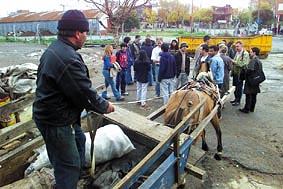 Participants
in the "Youth and Globalization" seminar visited one
of Buenos Aires’ poorest neighbourhoods, where 50,000 people
live in poverty and adversity. They saw some of the social effects
of globalization first hand, but also some examples of resistance.
Participants
in the "Youth and Globalization" seminar visited one
of Buenos Aires’ poorest neighbourhoods, where 50,000 people
live in poverty and adversity. They saw some of the social effects
of globalization first hand, but also some examples of resistance.
© Credit: Adrián Stehlik/WCC |
The
call was made in a message to Protestant churches in the region
from a continent-wide consultation on "Globalizing the Fullness
of Life" that took place in Buenos Aires, Argentina, 28 April-1
May 2003.
The
message also rejected the Free Trade Area of the Americas (FTAA),
and called for "broad and deep integration, based on human
rights and care for creation".
Convened by the Latin
American Council of Churches (CLAI) and jointly hosted by the
World Council of Churches (WCC) and other ecumenical organizations,
the consultation discussed the impact of globalization and economic
integration in the region.
The "sinful and
hypocritical nature of the system that governs us" was condemned,
though some representatives did note the positive effects of globalization
in, for example, the countries of Eastern and Central Europe.
"There are no easy answers to such a complex issue,"
the meeting was warned.
More than a hundred
participants, including representatives from Africa, Asia, the
Pacific, Europe and North America, also discussed forms of pastoral
care the churches could develop to counter the exclusion and poverty
generated by the policies of the international financial institutions.
Debate focused on the
document "Looking for solutions...moving forward. The Protestant
churches say enough is enough!" — a synthesis of regional
reflections on the issues. CLAI will publish the final version
later this year, and use it in advocacy and lobbying work with
the international financial institutions.
The
Buenos Aires consultation was preceded by a continent-wide "Youth
and Globalization" event that brought young people together
in the same city, 24-27 April.
|

|
Mission
and evangelism conference
Athens, Greece, is
to be the site of the next world conference on mission and evangelism.
The conference, to be held 12-19 May, 2005 has the theme "Come
Holy Spirit, Heal and Reconcile. Called in Christ to be Reconciling
and Healing Communities". Approximately 500 participants
are expected. The last such conference took place in Salvador
de Bahia, Brazil in 1996.
At an April 2003 meeting
of the World Council of Churches (WCC) Commission on World Mission
and Evangelism (CWME), the conference venue and dates were adopted,
along with the stated aim "to empower participants to continue
in their call to be in mission together and to work towards reconciliation
and healing in Christ, in God’s world today". Visibility
is to be given to various concerns, including: the CWME study
process on women and missiology; the role of the Holy Spirit in
mission, healing and reconciliation; links with the WCC’s
Decade to Overcome Violence; and biblical studies on reconciliation
and healing. |

|
Fellowship
and finances guide decision to relocate some WCC offices
Seeking new ways to
strengthen relationships, and needing to make financial adjustments,
the World Council of Churches (WCC) Executive Committee in February
confirmed that the Council’s Pacific and Middle East desks,
and its Indigenous Peoples Programme, will relocate by July 2003.
WCC director of Programme
Geneviève Jacques notes that the decisions on these relocations
were driven by specific relational and diaconal needs. Concern
for the Christian presence and witness in the Middle East, especially
in the present political context, led to hopes that a WCC office
in situ could streng-then cooperation between WCC, Middle East
Council of Churches (MECC) and Action by Churches Together (ACT)
initiatives.
In the Pacific, the
hope is that a stronger WCC presence will reduce the problems
of geographical distance and allow closer attention to the needs
of churches and ecumenical organizations in the region. Responding
to concern that relocation might cause Pacific issues to disappear
from the global ecumenical agenda, a staff delegation visited
the Pacific at the end of March to explain the relocation, listen
to the churches, and ensure careful follow-up.
The Indigenous Peoples
Programme will move to Bolivia in June, and connect more closely
with the work of the Latin American Council of Churches (CLAI).
Since 1994, the WCC has provided facilities for Indigenous Peoples
to meet in Geneva and to access United Nations bodies and conferences
related to their struggle. As WCC staff responsible for this programme,
Eugenio Poma Añaguaya noted that the challenge for the
WCC will be to maintain its global commitment to Indigenous Peoples,
and to ensure that their unique theological and spiritual contributions
continue to be shared with the ecumenical family. "Gradually,
we have built strong relationships and trust with many groups.
We need to keep them," he says. |

| New
African fellowship
The formation of sub-regional
ecumenical fellow-ships of churches and councils of churches is
"a realistic response to Africa’s diversities and communication
infrastructure difficulties". Preparing to join three existing
sub-regional bodies associated with the World Council of Churches,
the new Fellowship of Christian Councils, Churches and Church-related
Associations in Central Africa (COFCEAC) will cover Cameroon,
Central African Republic, Republic of Congo, Gabon, Equatorial
Guinea, Sao Tomé & Principé, and Chad.
The new fellowship
hopes to promote shared witness and service, sub-regional solidarity,
justice, peace and reconciliation, and to favour exchange of information
and sharing of resources.
Meeting in Yaoundé,
Cameroon on 7 February 2003, Central African church leaders elected
Fr Bernard Diafouka from Congo Brazzaville, Rev. Dr Mfochive from
Cameroon, and Rev. Jean Emile Ngue, also from Cameroon, as COFCEAC’s
coordinator, moderator, and treasurer, respectively. The new fellowship’s
initials — COFCEAC — are an acronym of its French
name. The other African sub-regional fellowships are: FOCCISA
for Southern Africa, FECCLAHA for the Great Lakes and the Horn
of Africa, and FECCIWA for West Africa. |

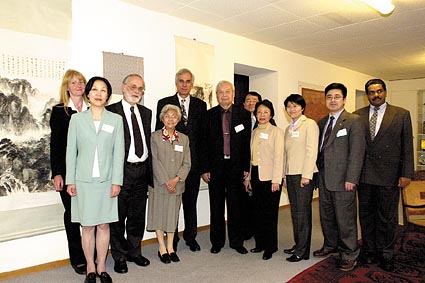
From
left: Rev. Kersten Storch (WCC), Ms Chen Meilin, (CCC), Mr Huibert
Van Beek (WCC), Rev. Cao Shengjie (CCC and China YWCA), Rev. Dr
Konrad Raiser (WCC), Rev. Ji Jianhong (TSPM and Nanjing Union Theological
Seminary), Rev. Mei Kangjun TSPM, Tian Feng), Dr Ms. Theresa Carino
(Amity Foundation), Rev. Wang Aimin (Jinling Union Theological Seminary),
Dr Mathews George (WCC).
© Peter
Williams/WCC |
China
Christian Council
A
seven-member delegation from the China Christian Council (CCC) and
the Three-Self Patriotic Movement (TSPM) of Protestant Churches
in China visited the World Council of Churches on 28 April 2003.
Led by CCC president Rev. (Ms) Cao Shenjie and TSPM chairperson
Rev. Ji Jianhong, the delegation took part in a seminar on the current
situation of the churches in China, their witness and service, and
the status of women in the church.
|

Sign
up for WCC News by E-mail
To
reduce mailing costs and enable broader distribution, the next
and future issues of WCC News will be distributed electronically.
To receive an electronic version, complete our online form at
http://www2.wcc-coe.org/wccregistration.nsf, indicating
the language (French, German, Spanish, English) you would like
to receive. Please specify your mailing address so that we can
find and remove it from our our surface mail distribution list.
Thanks for helping us reduce costs through improved service!
|

Recent
Resources
|
Keith
Clements
THE
CHURCHES IN EUROPE AS WITNESSES TO HEALING
The general
secretary of the Conference of European Churches on the
churches’ role in a pluralist society, Christian
unity and peace-making, and Europe’s need for healing
and reconciliation.
140pp.,
Sfr.23.00, US$16.00, £10.50, Euros 16.00
Michael Taylor
CHRISTIANITY,
POVERTY AND WEALTH
The
Findings of "Project 21"
Published jointly
by SPCK and WCC
112pp.,
Sfr.23.00, US$15.90, £9.99, Euros 15.00
Ndungane, Njongonkulu
A
WORLD WITH A HUMAN FACE
A
Voice from Africa
Published jointly
by SPCK and WCC
160pp.,
Sfr.27.50, US$19.00, £11.99, Euros 18.00
Ola Tjorhom,
ed.
APOSTOLICITY
AND UNITY
Essays on the Porvoo Common Statement
Published jointly
by Eerdmans and WCC
288pp., Sfr.43.50, US$30.00, £18.90, Euros 29.50
Ian Fraser
MANY
CELLS — ONE BODY
Stories from Small Christian Communities
SCCs,
bearers of good news in a troubled world, embody the classic
marks of a church that is one, holy, catholic and apostolic.
128pp., Sfr.16.00, US$10.90, £6.95, Euros 9.95
|
VIDEO
Ending
the Illegal Occupation of Palestine: Support a Just Peace
in the Middle East
Local Christian
and other religious leaders, and Palestinian and Israeli
human-rights activists outline the root causes of violence
in the region and the opportunity for a just peace.
21 mins, PAL and NTSC. One copy free: donations towards
postage costs or the Ecumenical Campaign to End the Illegal
Occupation of Palestine are welcome. For online donations
and further information: http://wcc-coe.org/wcc/donations/index-e.html
"My
Peace I Give To You"
Brochure
for the Week of Prayer for Christian Unity 2004.
Prayers and
readings, and a suggested liturgy for an ecumenical service
based on a theme and text suggested by a local ecumenical
group. Prepared by an international committee.
36pp., free of charge, also French
Nicholas
Lossky, José Míguez Bonino, John Pobee,
Tom Stransky, Geoffrey Wainwright and Pauline Webb, eds
THE
DICTIONARY OF THE ECUMENICAL MOVEMENT
Second,
updated, edition of this standard reference work.
1332pp., illustrated, Sfr.125.00, US$77.50, £58.00,
Euros 79.00
|
|

|
| • For
your 2006 calendar: the next World Council of Churches (WCC) assembly,
to be held in Porto Alegre, Brazil, is scheduled for 14-23 February
2006, subject to further work on the programme and consultation
with university authorities and local churches. The dates, theme,
number of delegates, and policy on subsidies will be decided by
the WCC Central Committee in August 2003.
• The election of the next WCC general
secretary will be one of the highlights of the next,
26 August-2 September 2003, Central Committee meeting in Geneva.
The agenda includes plenary sessions on "Caring for Life";
the theme will be interpreted by young people, through a regional
focus on Latin America, by highlighting an interim theological
statement prepared by the WCC Ecumenical Disabilities Advocates
Network, and by addressing challenges raised by genetic engineering.
|
• A 31
March-3 April 2003 WCC staff visit to Cyprus highlighted
the need for reconciliation efforts between the Turkish and Greek
Cypriot communities as part of — not a result of — political
negotiations to reunify the island. "A peace plan has to engage
the people of Cyprus at the grassroots, not just the tree-tops,"
says Salpy Eskidjian, WCC executive secretary in the International
Affairs team. Eskidjian and Peter Weiderud, director of the WCC
Commission of the Churches on International Affairs, visited with
representatives of the Church of Cyprus (Greek Orthodox), political
leaders, United Nations and European Union representatives, and
members of joint Greek-Turkish civil society groups. Recommendations
on how the WCC and the churches can accompany ongoing peace efforts
will be brought to the Central Committee in August 2003.
• Kenneth Kaunda, former president
of Zambia, will be the keynote speaker on North-South relations
in an age of globalization at the 12th |
Assembly
of the Conference
of European Churches (CEC). The assembly is to be held
in Trondheim, Norway, from 25 June through 2 July, 2003. Other announced
speakers and preachers include Bartholomew I, Ecumenical Patriarch
of Constantinople, Isabelle Graesslé, moderator of the Company
of Pastors of the Geneva Protestant Church in Switzerland, and Rowan
Williams, archbishop of Canterbury. The theme of the assembly is
"Jesus Christ Heals and Reconciles: Our Witness in Europe".
• International Orthodox Christian
Charities (IOCC) and the Orthodox Christian Mission Centre in
the USA have won the prestigious Athenagoras Human Rights
Award, presented annually by the Order of St. Andrew
the Apostle. The Orthodox Christian Mission Centre is the principal
group through which US Orthodox Christians support church mission
work. The IOCC was founded in 1962 and has distributed more that
160 million US dollars in relief assistance for 22 countries.
|
WCC
News is published four times a year and distributed free of
charge.
However, if you wish to make a contribution (the equivalent
of US$20 minimum), payable by cheque made out to "WCC"
or Visa or Mastercard, this would be welcome. Please indicate "For
WCCNews"
Produced by:
WCC Public Information
Team
Managing
editor:
Sara Speicher
For further information write to:
WCC NEWS, WCC Public Information Team, P. O. Box 2100, 1211 Geneva
2, Switzerland
Telephone: (41-22) 791 6111; General Fax: (41-22) 791 0361; E-mail
for enquiries:infowcc@wcc-coe.org;
WCC Communication fax: (41 22) 798 1346
Please feel free to reproduce this material and pass it
on, acknowledging the source
Design:
Marie Arnaud Snakkers
Printed in Switzerland
©WCC
Original: English |
©
2003 world council of churches | remarks to
webeditor@mail.wcc-coe.org
|
